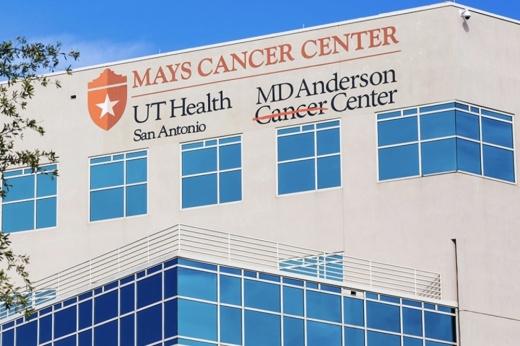The American Cancer Society recently awarded two grants totaling $545,000 to the San Antonio-based Mays Cancer Center, home to UT Health San Antonio and its MD Anderson Cancer Center.
According to a news release from UTHSA, the American Cancer Society last April announced it was donating $480,000 toward an institutional research grant and $65,000 for cancer support grants.
American Cancer Society CEO Dr. Karen Knudsen formally presented the donation checks in a recent visit to the Mays Cancer Center, which included a meeting with researchers and a touring of the North Side facility.
Mays Cancer Center officials said Knudsen’s visit was a chance to bolster the center’s partnership with the ACS toward improving cancer research and access to cancer care.
“Together with the American Cancer Society, we are able to decrease the burden of cancer in our community. Our partnership with ACS is paramount to our mission. Through a myriad of efforts, which include patient support, cancer screenings and advocacy, we can work closely with ACS to fight cancer across San Antonio, South Texas and beyond, Mays Executive Director Dr. Ruben Mesa said in a statement.
According to the release, the institutional research grant was awarded to Dr. Robin Leach, who is a professor for the Mays Center’s department of cell system and anatomy as well as an associate director for education. The grant will fund early investigators and help to increase the number of researchers reflecting the San Antonio area's cultural diversity.
ACS officials said the organization has assisted the Mays Center by providing patients with transportation and lodging.
ACS leaders also applauded the Mays Center’s efforts to address health disparities in the Latino community, including tackling the rising number of cancer cases by recruiting more Latinos for clinical trials.
“Health equity means everyone has a fair and just opportunity to prevent, find, treat and survive cancer. We want to continue our collaboration with UT Health San Antonio by working to prevent health disparities in Latinos and high-risk populations,” Knudsen said.





